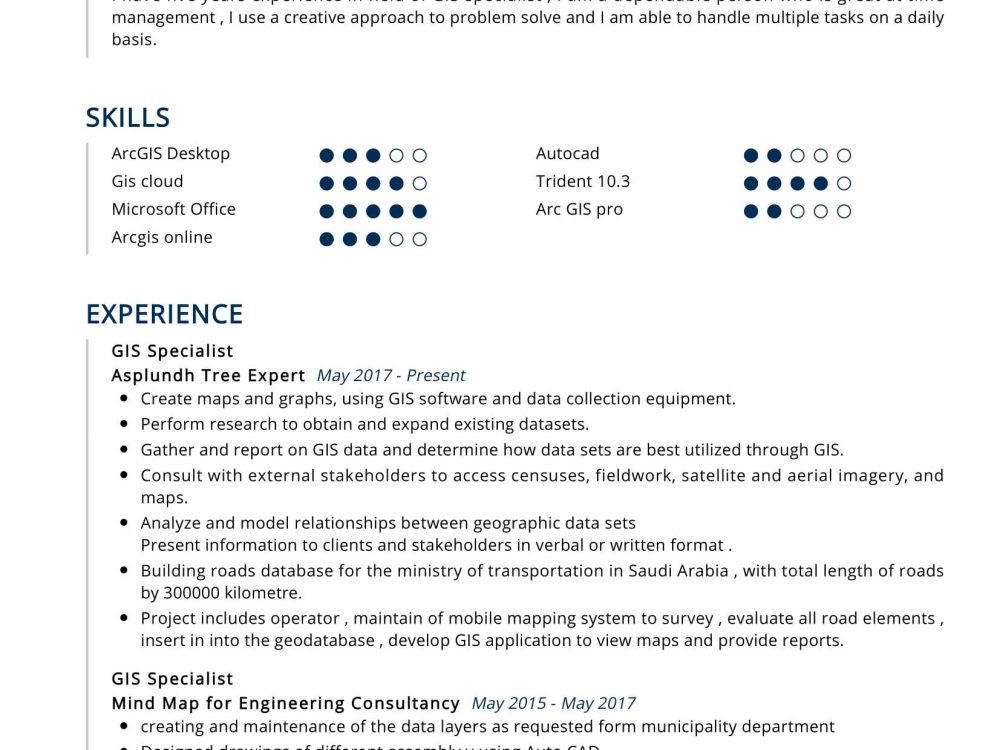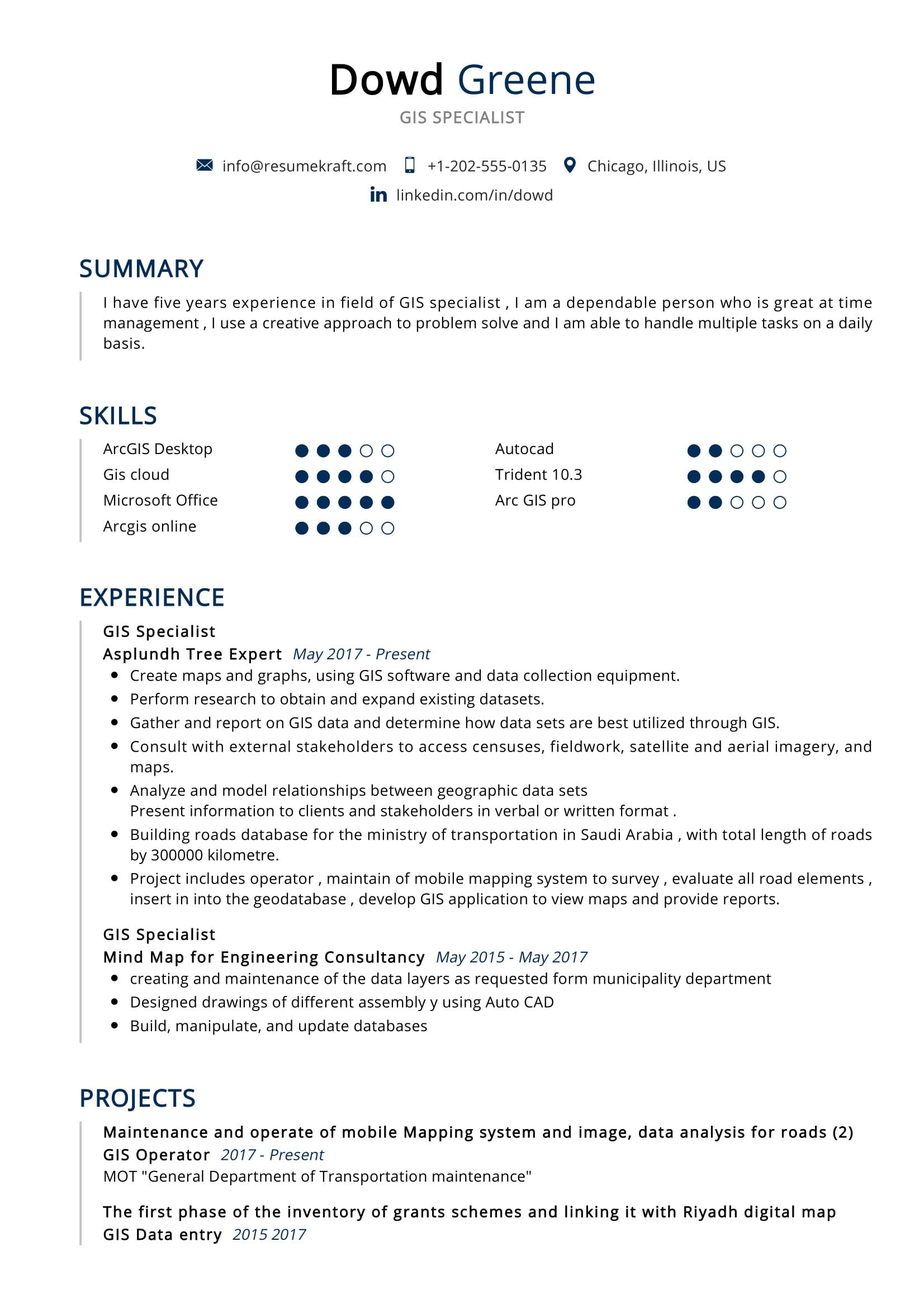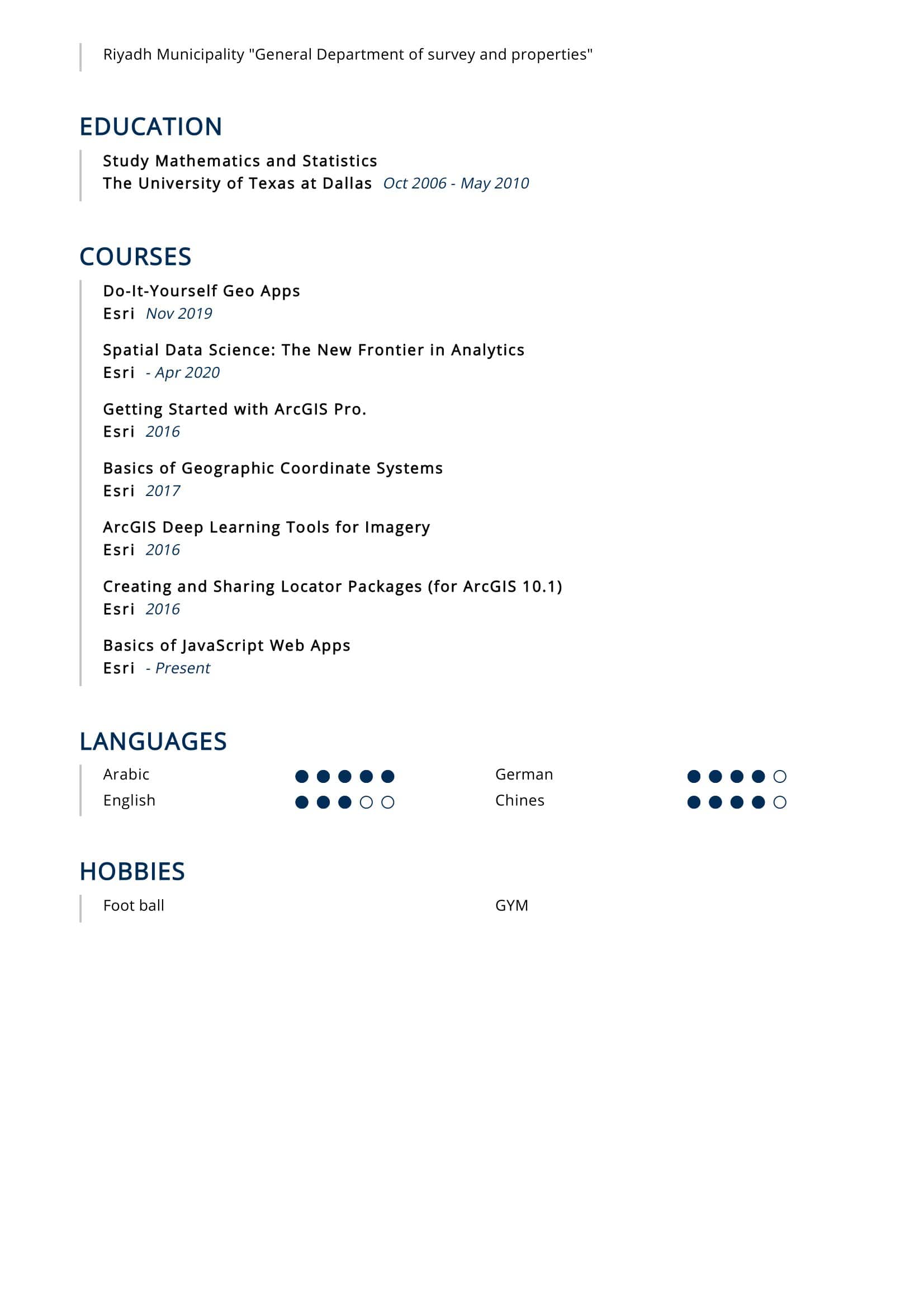Are you a GIS Specialist by profession and looking for an exciting career? We have good news for you! use our professional GIS Specialist Resume Sample. You don’t have to start writing from scratch. Just click “Edit Resume” and modify it with your details. Update the template fonts and colors have the best chance of landing your dream job. Find more resume samples.
GIS Specialist Resume Sample
Dow Greene
GIS Specialist
Summary
I have five years experience in the field of a GIS specialist, I am a dependable person who is great at time management, I use a creative approach to problem solve and I am able to handle multiple tasks on a daily basis.
Skills
Work Experience
GIS Specialist
Asplundh Tree Expert
- Create maps and graphs, using GIS software and data collection equipment.
- Perform research to obtain and expand existing datasets.
- Gather and report on GIS data and determine how data sets are best utilized through GIS.
- Consult with external stakeholders to access censuses, fieldwork, satellite and aerial imagery, and maps.
- Analyze and model relationships between geographic data sets
Present information to clients and stakeholders in verbal or written format . - Building roads database for the ministry of transportation in Saudi Arabia , with total length of roads by 300000 kilometre.
- Project includes operator , maintain of mobile mapping system to survey , evaluate all road elements , insert in into the geodatabase , develop GIS application to view maps and provide reports.
GIS Specialist
Mind Map for Engineering Consultancy
- creating and maintenance of the data layers as requested form municipality department
- Designed drawings of different assembly y using Auto CAD
- Build, manipulate, and update databases
Projects
Maintenance and operating of the mobile Mapping system and image, data analysis for roads (2)
GIS Operator
The first phase of the inventory of grants schemes and linking it with the London digital map
GIS Data entry
Education
Study Mathematics and Statistics
The University of Texas at Dallas
Languages
- French
- English
- German
- Chines
Career Expert Tips:
- Always make sure you choose the perfect resume format to suit your professional experience.
- Ensure that you know how to write a resume in a way that highlights your competencies.
- Check the expert curated popular good CV and resume examples
GIS Specialist Resume with Writing Guide
If you are considering a job as a GIS Specialist, you may be wondering how to put together the perfect resume.
There are many things to keep in mind when writing your resume – including where you would like your focus to be, the format of your resume, and what kind of information is relevant.
Here is a quick overview of how to write the perfect GIS Specialist Resume:
- Your “Who Am I?” statement should summarize who you are professionally and personally in one sentence.
- Be sure to highlight your skills, job experiences, and achievements.
- State the type of work you are looking for (a GIS Analyst, GIS Project Manager, GIS Support Specialist etc)
- If you are converting to a full-time position with benefits, list that information on your resume.
- Mention any awards or recognitions for your previous work; this shows the employer you have leadership qualities and can think on your feet.
- List any technical skills and software you have along with your related job experience.
- Mention any special work or volunteer experiences that are relevant to the job; this shows that you can handle responsibilities outside of the office.
- Be sure to spell check and proofread. It is a great idea to ask a friend or family member to proofread your resume as well.
- Use the MS Word resume template below as a guide; it has examples of all the sections listed above.
- The most important part of your resume is the “contact information” section. This includes your name, address, phone number, and email address.
- Prior to sending in your resume, make sure you have all the information about the job in which you are applying for (company name, position title, etc).
- Keep it simple; avoid embellishing or adding pages that aren’t necessary.
- Print out several copies of your GIS Specialist Resume and send it in electronically with a cover letter.
GIS Specialist Responsibilities:
- Collaborate with clients and other team members to create, maintain, update and deliver GIS data products for a project.
- Maintain the GIS database by importing and updating new data files from multiple sources; verifying the accuracy of attribute information in the database, verifying name and address information for label editing.
- Interface with City staff to update data layers within the City’s GIS Interface, ensuring that all layers are up-to-date with fieldwork throughout the City.
- Provide geospatial analysis and information to customer projects or activities.
- Perform GIS tasks including, but not limited to, the following: Location-based data (GPS) collection of environmental data, periodic surveys of all schools in the City (location), mapping and surveying tools (e.g. GPS, AutoCAD), insure data is current and correct, coordinate with City departments to identify project/task needs, GPS equipment and software maintenance.
- Assures that all GIS data imported into the City’s central GIS database is accurate and conforms to internal standards through verification of data sources, internal field work or research.
- Attend meetings with clients as required to present maps for information purposes only or oral presentations using GIS-produced data or maps.
- Participates in GIS research and development as required.
- Assumes added responsibilities as and when assigned to support the GIS project as needed.
- Assists in maintaining a high level of customer service by fostering an atmosphere that is collaborative, cordial, positive and professional while following all City policies and procedures in performing job duties.
Top 10 GIS Specialist Skills:
- Calculation: You Calculate a lot, mainly in ArcGIS. If you use the decimal places of your data in calculations, then you are a GIS Specialist.
- Research: Most GIS Specialists have to do some research before they produce a model, map or table for someone else to work with. Research is usually related to data that may be in other databases.
- Translate Data: Translating or converting data from one form to another is a common type of task for a GIS Specialist. Examples include translating addresses into coordinates, latitude and longitude into street names, or zip codes into census tract names.
- Find And Organise: You spend much of your time updating and correcting data. This includes working with data entered by others. You identify data errors and remove them, or you make sure that database records are consistent.
- Create: You create models from scratch, or update existing ones with new map layers, layers to add attributes to the map or tables with metadata that describes the data on the layer being created.
- Edit And Clean Data: This might be a bit of a misnomer for most GIS Specialists! They almost always edit and clean existing data, instead of creating new data from scratch.
- Author: You make maps or write a report that’s based on the data you’ve created, or you create an interactive map for your organization.
- Analyse: Most GIS Specialists are used to using the ‘what’, ‘where’ and ‘how’ of their work, and need to make sense of new information they find, as well as new data they can use in their models.
- Study: GIS Specialists study new products, such as ArcGIS Online or a specific technology like GPS, and use what they’ve learnt to improve their work.
- Share: You do some training, either in person or online, explaining what you do to others around you in your organisation.
Tips to write a GIS Specialist Resume Summary:
- Summarize the skills you have that are required for the job in a few lines.
- Keep your summary personal and concise.
- Use action verbs to emphasize your experience, knowledge and strongest skills.
- Employ your resume summary as an anchor that will lead to the rest of your resume.
- Keep it concise but clear.
- Include work experience and skills related to Geographic Information Systems (GIS).
How to write a GIS Specialist Resume with No experience:
- Not all experience is a good experience. Some jobs can be more hindering than helpful. A bad position on a resume will make an employer think that you will be a bad fit for future positions.
- List only relevant projects and ensure your skills are reflected in those projects.
- Do not over-embellish your resume with trite statements about yourself and your abilities.
- Keep the resume short. If you can say it in a few words, don’t use up valuable space explaining.
- Don’t include personal information you’re not prepared to discuss, including your age and marital status.
- Do not use special characters in your resume such as weird symbols or scripts.
- Do not use all caps or sizes that are too large or small.
- Make sure your cell phone is set up properly on your resume so you can be easily reached when a potential employer calls you about the position they are trying to fill.
How to write a GIS Specialist Cover Letter:
- Use a free cover letter template online.
- Write the basics such as address, date, and greeting, etc.
- Add specific details from your experience to make it more interesting and relevant.
- Introduce yourself and summarize what you can contribute to the company or organization you are applying to.
- Conclude by thanking the employer for their consideration and letting them know you are looking forward to hearing from them soon (closing statement).
Key Takeaways:
- Resume should be geared toward getting a job, not just creating a document.
- A resume is often the first impression of you to your potential employers and should represent what you have to offer.
- Keep it simple and clear, yet give enough details for the employer to see what you have done that would interest them in hiring you.
- You are selling yourself as a commodity; make sure that your resume speaks to what companies want most in an employee while also representing who you are as a person.



